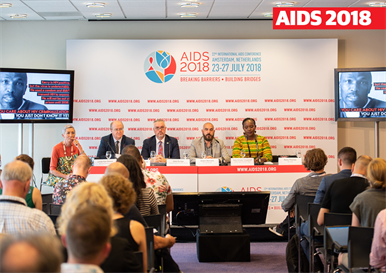
In February, 2018, a 30-year-old man in Kenya was charged with transmission of HIV after he allegedly bit a police officer while resisting arrest. In March, a woman in the USA was arrested for alleged criminal exposure to HIV through spitting. And in July, a Canadian man was sentenced to 43 months in prison for not disclosing his HIV status, even though his sexual partners did not contract the virus. Too often, the criminal law is applied to people with HIV in an overly broad manner. To combat myths and misconceptions that fuel HIV criminalisation, 20 experts in HIV science, epidemiology, and clinical care have released a consensus statement on the science of HIV in the context of criminal law, launched in Amsterdam, the Netherlands, on July 25 at the AIDS 2018 conference.
Amid moral panic about AIDS, in 1987 the USA became the first country to introduce HIV-specific criminal laws. Today, at least 68 countries have laws that criminalise HIV transmission, non-disclosure, or exposure, and 33 countries have used other criminal laws to prosecute such cases. Between April, 2013, and October, 2015, the HIV Justice Network recorded at least 313 arrests, prosecutions, and convictions in 28 countries for these crimes, with the highest numbers occurring in Russia (115), the USA (104), Belarus (20), and Canada (17). In many jurisdictions, the content and application of these laws do not account for the true nature of HIV exposure and transmission risks, the scientific limitations involved in proving whether a person transmitted the virus to another, or the realities of living with HIV in the era of effective anitiretroviral therapy (ART). Some people have been prosecuted where actual transmission of HIV did not occur or was not even alleged, when harm was not intended, and where the risk of transmission was very low. As a result, rather than being reserved for cases where an individual intentionally transmits the virus to another person—as advocated by UNAIDS and others—these laws often impose criminal liability on no better basis than the fact that a defendant has HIV.
The consensus statement is intended to assist experts involved in cases of alleged HIV exposure, transmission, or non-disclosure. It reiterates several longstanding facts, including that HIV is not transmitted through saliva by biting, spitting, or kissing, and that correct use of a condom prevents HIV transmission. It also provides updated information on the risk of transmission in the context of ART use and successful viral suppression, the effectiveness of pre-exposure prophylaxis, and the likelihood of transmission through different sexual acts. Key messages include that there is effectively no risk of HIV transmission by a person who has an undetectable viral load, that phylogenetic analysis cannot conclusively prove that one person transmitted HIV to another, and that ART has led to a dramatic reduction in HIV-associated morbidity and mortality, such that people living with HIV can live long and fulfilling lives.
Criminalising people for having HIV is a violation of human rights that undermines public health efforts to control the epidemic. Prosecutions for HIV-specific crimes often flout core legal principles such as intent and causation. There is no evidence that applying the criminal law to HIV reduces its spread. Rather, such approaches promote fear and stigma about HIV, can adversely affect relationships between patients and health-care providers, and can discourage people from seeking HIV testing and treatment. HIV criminalisation has particularly profound effects on women. Because women are often the first in a household to learn their HIV status, they can become vulnerable to blame and violence. The threat of prosecution is a potential disincentive for women to leave abusive relationships, and some laws are so broad that they criminalise transmission of HIV during pregnancy and breastfeeding.
The consensus statement is a welcome contribution to efforts to end the overly broad application of criminal law in HIV. Alongside better use of scientific and medical evidence in legal settings, however, prosecutors, governments, policy makers, and medical and legal professionals must recognise that the only effective approach to ending the HIV epidemic is a rights-based approach. In 1991, former Justice of the Australian High Court Michael Kirby argued in The Ten Commandments for AIDS Law that “respect for universal rights is most needed when they are most at risk of being forgotten, as in the middle of an epidemic”, concluding that by winning the trust of people affected by HIV “we protect them—and by protecting them, we protect ourselves and our world”. HIV criminalisation alienates and stigmatises already vulnerable populations at a time when their engagement with services is most critical.








